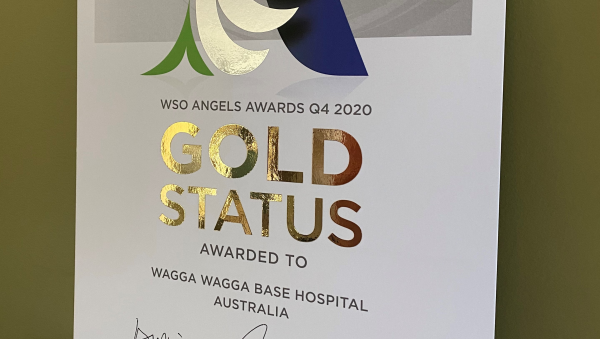The stroke unit at Wagga Wagga Base Hospital has become the first in Australia to receive a World Stroke Organization Angels Gold Status Award for meeting the highest standards in treatment.
The Angels initiative, a partnership between the World Stroke Organization, European Stroke Organisation and Boehringer Ingelheim, aims to optimise the standard of treatment in stroke centres worldwide and improve patient outcomes by setting global benchmarks.
This award has been facilitated by the Australian Stroke Coalition and the Florey Institute of Neuroscience and Mental Health. It was open to hospitals contributing data to the Australian Stroke Clinical Registry.
A recent report by the Stroke Foundation found people living in regional Australia are 17 per cent more likely to suffer a stroke than those living in metropolitan areas.
Head of the Wagga Wagga Hospital Stroke Unit, Associate Professor Martin Jude, said “the greatest battle is against time” when it comes to stroke.
“With each minute that goes by more brain cells are lost and the risk of disability and death increases,” he said.
“In regional Australia, we not only have higher rates of stroke but have to contend with the challenges of rapid access to expert care over long distances.”
Wagga Wagga Base Hospital has the only dedicated stroke unit in the Murrumbidgee Local Area Health District. It serves a population of nearly 250,000 people across a 125,000 square kilometre catchment area.
The hospital, where up to 450 admissions to its stroke unit occur each year, has implemented a range of procedures to ensure patients receive optimum care.
“We recognised that stability of staffing and the depth of skill across our unit was critical,” said Professor Jude.
“We have invested in education and training starting with Ambulance, Emergency Department, radiology and all members of the stroke unit team, meaning stroke symptoms are recognised rapidly and we’re able to deliver the right treatment at the right time.”
Professor Jude said one of the hospital’s key achievements was ensuring more than 70 per cent of eligible patients receive clot-busting therapy (recanalisation) within 60 minutes of arriving at the hospital.
“This is an outstanding result, for our team and for patients being treated for stroke,” he said.
The Angels initiative Medical Project Manager in Australia, Kim Malkin, said Wagga Wagga was the first Australian hospital to achieve Gold Status and the objective was to ensure all hospitals reach these global benchmarks.
“To achieve gold status a hospital must demonstrate a range of outcomes. This includes more than half of all eligible patients with stroke receiving treatment within 60 minutes of hospital arrival – at Wagga Wagga they’ve been able to do even better,” she said.
Australian Stroke Clinical Registry (AuSCR) lead, Professor Dominique Cadilhac from The Florey Institute and Monash University, congratulated Wagga Wagga Base Hospital on their achievement.
“This award acknowledges the leadership and dedication of Martin and his team, while underscoring the importance of high quality, standardised data collection and review of performance to improve stroke care,” she said.
Professor Cadilhac said, “National and international benchmarking is critically important to the management of stroke in Australia and reducing variation in practice. This is why AuSCR and the Australian Stroke Coalition is supporting hospitals to participate in international recognition awards such as the Angels awards program.
“We are very pleased to have worked with Monash University to have the analysis independently run using deidentified data from AuSCR and in consultation with our European counterparts at St. Ann's University Hospital Brno, Czech Republic.
“We need to ensure Australian stroke units are meeting best practice standards and identify where more support is needed. We encourage hospitals across Australia to follow the lead of Wagga Wagga and become involved in benchmarking programs that can be facilitated in partnership with our peak non-government organisations (Stroke Foundation and Stroke Society of Australasia that lead the Australian Stroke Coalition), academics, and clinicians.”
